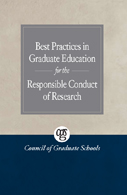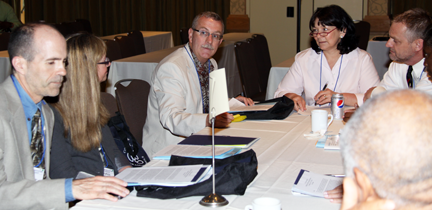You are on CGS' Legacy Site.
Thank you for visiting CGS! You are currently using CGS' legacy site, which is no longer supported. For up-to-date information, including publications purchasing and meeting information, please visit cgsnet.org.
General Content
Awardees
The Council of Graduate Schools, with funding from the Office of Research Integrity, awarded grants to 10 universities to develop research ethics training programs for graduate students.
As part of CGS’ Responsible Conduct of Research (RCR) initiative, the grants targeted students in the physical sciences and engineering, as well as interdisciplinary programs.
The institutions that received awards were:
University of Missouri—Columbia
Affiliates
Chicago School of Professional Psychology
Florida International University
University of Arkansas—Little Rock
University of California—Davis
University of Illinois—Urbana-Champaign
University of Maryland—Baltimore County
University of Massachusetts—Amherst
University of North Carolina—Chapel Hill
University of North Carolina—Charlotte
University of Wisconsin—Madison
In 2006, the Council of Graduate Schools received a two-year grant from the National Science Foundation (NSF) to fund Ethics Education in Science and Engineering programs at eight of its member institutions to develop interdisciplinary research-ethics programs for graduate students (2006-2008). This project built upon an existing CGS initiative, funded by the Office of Research Integrity (ORI), whereby ten institutions were given awards to develop training programs in the responsible conduct of research (RCR) for graduate students in the behavioral and biomedical sciences. The NSF-funded project incorporated and expanded what is being learned in that initiative.
Through the NSF project CGS sought to make training of graduate students in RCR a regular feature of graduate education. The project advanced this goal by adding students in science and engineering to the cohort of students currently being reached by CGS-supported RCR projects.
This new cohort of students was required not just to understand the professional standards of their disciplines, but to recognize, articulate, and deliberate ethical issues that arise in interdisciplinary research and in public-policy arenas. Assessment strategies for the NSF project included measurement both of individual ethical development and of the ethical climate of the research units involved.
The project resulted in a monograph, Best Practices in Graduate Education for the Responsible Conduct of Research, which identified best practices in the development of research ethics programs for graduate students in science and engineering.
Resources
 Best Practices in Graduate Education for the Responsible Conduct of Research (2009)
Best Practices in Graduate Education for the Responsible Conduct of Research (2009)
This publication documents the results of a collaborative project, supported by a grant from NSF, between CGS and eight universities to identify best practices in the development of research ethics programs for graduate students in science and engineering. Topics addressed include curricular approaches, program sustainability, considerations specific to master’s-focused institutions, and assessment.
Best Practices in RCR Awardees and Affiliates
Contact
Graduate Education for the Responsible Conduct of Research (2004-2006) was a research and demonstration project sponsored by the Council of Graduate Schools and made possible by a contract from the U.S. Department of Health and Human Services, Office of Research Integrity (ORI).
The goals of the project, generally, were to:
- Develop a core of graduate dean leaders in RCR on CGS member campuses
- Generate information about what works in RCR training of graduate students
- Document the results of the ten pilot projects in a monograph on best practices
Through the project, CGS provided ten institutions with $15,000 awards to develop and test interventions and assessment strategies for the training of behavioral and biomedical sciences graduate students in the responsible conduct of research.
CGS created opportunities for awardees to share lessons and outcomes with the broader graduate community through meetings, workshops, and an active electronic forum. The leverage point for the training programs at each institution was the graduate school, and the graduate deans at the ten institutions. In addition deans from twenty-five other institutions affiliated with the project collaborated to discover the best practices to achieve the goals of the project.
The project resulted in a monograph, Graduate Education for the Responsible Conduct of Research, which identifies best practices in responsible conduct of research education.
Resources
 Graduate Education for the Responsible Conduct of Research (2006)
Graduate Education for the Responsible Conduct of Research (2006)
This publication identifies best practices in responsible conduct of research (RCR) education and is aimed at helping graduate deans, department chairs, and faculty members establish and sustain educational programs that foster RCR on their campuses.
Graduate Education for RCR Awardees and Affiliates
Contact
GradEdge
GradEdge is a quarterly online newsletter about national issues and trends in graduate education including recent research on graduate education, the latest developments in government and public affairs, updates on CGS Best Practice Projects, recent changes within the graduate dean community, and information on upcoming meetings. Issues are published in Winter, Spring, Summer, and Fall.
Washington Insights & Highlights Newsletter
Washington Insights & Highlights Newsletter keeps CGS members and stakeholders apprised of current federal policy and advocacy issues related to graduate education. The Washington Insights and Highlights Newsletter is a members-only resource. To learn more about how to become a member of the Council of Graduate Schools, please click here.
Insider Update
Insider Update is a quarterly online newsletter designed for CGS Sustaining Members. Newsletter content includes developments in collaborative research projects, outreach opportunities, and news and updates relevant to our sustaining members.
CGS provides members with professional development resources and opportunities through interactive sessions at regular meetings, as well as through interactive online forums. Special sessions at Annual Meetings and Summer Workshops are designed to support graduate leadership across all aspects of a graduate dean’s role, such as building relationships across campus, budget management, quality assessment, advocacy, and fundraising. In addition, the following member programs are specifically focused on professional development for graduate deans, associate deans, and assistant deans.
 Dean-in-Residence Programs
Dean-in-Residence Programs
The Council of Graduate Schools (CGS) hosts a Dean-in-Residence program.
 Summer Workshop and New Dean's Institute
Summer Workshop and New Dean's Institute
The annual Summer Workshop and New Dean’s Institute offers professional development and networking opportunities for new and experienced deans.
 CGS Webinars
CGS Webinars
CGS' interactive webinars provide information and guidance on topics of key interest to member institutions.
 CGS Career Portal
CGS Career Portal
The CGS Career Portal is a current listing of open positions for graduate deans, associate/assistant deans, administrative staff, as well as faculty and other higher education professionals.
Institutional Members (US and Canada)
Institutional Members organized by U.S. state
Sustaining Members and Corporate Partners
Corresponding Affiliate Members
CGS members are able to access additional information on all member types. Please log-in to access the:
Annual Dues: $4,000
Only qualifying educational nonprofit organizations (501c3, 501c4 or 501c6) or qualifying governmental organizations may join CGS as Corresponding Affiliates. Corresponding Affiliates receive the benefits of high-level membership in CGS for a discounted dues rate. Because Corresponding Affiliates are more closely aligned with institutional members of CGS, their benefits and dues structure reflect these priorities. CGS welcomes suggestions and ideas for other benefits that might be valuable to you or opportunities for our organizations to collaborate.
Member Benefits for Corresponding Affiliates
CGS Annual Meeting
- Reduced rates on sponsorships
- Reduced rates on exhibitor registration
- Option to add one complimentary exhibit-hall only registration pass to your CGS Annual Meeting exhibitor registration, in addition to the two full registrations that are included with exhibiting (available only to corresponding affiliates and sustaining members; exhibitor registration required)
- NEW - Option for members to select exhibit table location (exhibitor registration required)
- Reduced rates on individual meeting registrations
- Priority consideration for all Annual Meeting opportunities
- Opportunities to propose “in-conjunction-with” events at the CGS Annual Meeting
- Recognition in the meeting mobile app
- Opportunity to sponsor awards
CGS Webinars
- Reduced rates on sponsored CGS webinars
- Priority scheduling consideration
- Detailed attendee report
Access to graduate deans
- Opportunity to provide CGS-approved sponsored content for News Network, CGS's bi-weekly e-newsletter (once per calendar year)
- Invitations to CGS research forums and other select events
- Reduced rates for job listings on the CGS Career Portal
- Ability to request to view the CGS Dean’s Discussion List
Publications and information on the latest news, trends and best practices in graduate education
- Access to current and past issues of GradEdge, the only national newsletter dedicated to graduate education
- Full complimentary access to publications in the CGS Online Member Library, including the online membership directory
- Reduced rates for hard copies of CGS publications
- Automatic subscription to biweekly CGS News Network newsletters
Access to CGS staff expertise
- Opportunities to collaborate on research and best practice projects
- Tailored membership opportunities based on individual organizations’ needs
For more information about becoming a Corresponding Affiliate, please contact Adrienne Vincent.
Corresponding Associates are for-profit or not-for-profit organizations in the United States or Canada who support the Council's endeavors to further the cause of graduate education and whose missions are compatible with the Council's. As an Associate of CGS, you are entitled to:
- Access to national projects and studies of key interest and benefit to graduate education as well as the ability to solicit advice and information from experts in graduate education. This includes regular updates on federal policy affecting graduate studies and research.
- Qualify for priority exhibitor benefits at the CGS Annual Meeting which includes reduced registration rates, complimentary attendee address labels and preferred exhibitor space.
- Receive a complimentary subscription to GradEdge, the only national newsletter dedicated to graduate education. Also, receive reduced rates to display advertisements in GradEdge.
- Publish your website address and logo on the CGS website.
- Qualify for discounts on CGS meetings, workshops, publications, and consultations.
- Member discount rates for job listings on the CGS Career Portal
- Dues are currently $5,000 (USD) annually.
Interested parties should contact Julia Kent.
Overview
International Membership is open to institutions of higher education that are significantly engaged in graduate education, research, and scholarship. Applicant institutions must be committed to the pursuit of excellence and must already have been authorized to offer graduate level work by the appropriate national or regional body or organization.
Institutions seeking membership must offer graduate(*) degrees (degrees beyond the first university degree level) in at least three distinct disciplines. Institutions also shall have awarded, in the three consecutive years immediately preceding application, at least 30 degrees at the master's level, or 10 degrees at the doctoral level, or some combination thereof. Applicant institutions shall have designated an individual who is responsible for representing the institution's activities in graduate education (the graduate dean or equivalent). Only institutions outside of the United States and Canada are eligible for international membership.
(*) Graduate level education corresponds with Level 7 of the International Standard Classification for Education. Programs under ISCED Level 7 are for individuals who have a first university degree or equivalent, and are of two types: (1) extension of classroom laboratory-seminar type of learning leading to a master's degree or higher professional qualifications, or (2) original research resulting in a major dissertation, and leading to a doctoral degree.
Benefits for International Member Institutions
Representation and Visibility in the Graduate Community

- Publication of your institutional website address on the CGS website
- Access to the searchable online Membership Directory, which provides the names, titles, contact information, and academic fields of deans at member institutions
- Opportunities to advertise meetings, events and other items in GradEdge (fee-based)
Information and Best Practices

- Access to the CGS Dean's Discussion List, the only online platform for information exchange dedicated solely to graduate education
- A subscription to the GradEdge newsletter and online access to the members-only archives
- One complimentary copy of each CGS publication at the time that membership is approved
- Exclusive electronic access to all CGS publications via the CGS website
Professional Development and Networking Opportunities

- Opportunities to solicit advice and information from experts in graduate education and CGS leadership
- Eligibility to be invited to serve on best practice committees
- Opportunities to participate in webinars led by graduate deans and experts on pressing topics in graduate education
- Invitations to special receptions and events
- Ability to advertise job postings on the CGS Career Portal
Benchmarking and Consultation Services

- Benchmarking services and data available through members-only sections of the CGS website
- Strategic consultation services drawn upon CGS best practice expertise and benchmarking data as well as insights from experienced graduate deans (fee-based)
Public Policy

- Access to projects and studies of key interest and benefit to graduate education, including regular updates on U.S. federal policy affecting graduate studies and research
Reduced Rates

- Reduced member rates on CGS meetings, workshops, printed publications, benchmarking and consultation services, and advertisements in GradEdge.
- 50% off job announcements in the CGS Career Portal
How to Apply
To apply for international membership, please contact Janice Goggins.
Membership Dues Information
The 2020 and 2021 International membership dues levels are as follows:
| International Member Dues Category* | 2020 and 2021 Dues |
| Low-income and Lower-middle-income economies | $2,000 (USD) |
| Upper-middle-income economies | $3,000 (USD) |
| High-income economies | $4,000 (USD) |
*As defined by the World Bank Classification.
Regular and Associate Members (Universities and Colleges in the US and Canada)
CGS is supported primarily by member dues. Dues levels are established each year by the Board of Directors and collected annually, with dues notices sent to members in July. There are eleven dues categories for Regular and Associate Member institutions based on the head count of graduate students enrolled. The 2022 and 2021 Regular and Associate membership dues levels are as follows (please note that 2021 membership dues remained at the same level as 2020):
| Graduate Student Headcount* Enrolled | 2022 Dues Regular Members |
2022 Dues Associate Members |
| 1 - 500 | $3,515 | $3,222 |
| 501 - 800 | $4,736 | $3,874 |
| 800 - 1,200 | $5,186 | $4,428 |
| 1,201 - 1,500 | $5,487 | $4,807 |
| 1,501 - 3,000 | $5,830 | $5,106 |
| 3,001 - 5,500 | $6,188 | $5,655 |
| 5,501 - 8,000 | $7,074 | $6,197 |
| 8,001 - 10,500 | $7,962 | $6,974 |
| 10,501 - 13,000 | $8,903 | $7,798 |
| 13,001 - 15,500 | $9,739 | $8,529 |
| 15,501 and above | $10,621 | $9,303 |
| Graduate Student Headcount* Enrolled | 2021 Dues Regular Members |
2021 Dues Associate Members |
| 1 - 500 | $3,467 | $3,178 |
| 501 - 800 | $4,671 | $3,821 |
| 800 - 1,200 | $5,114 | $4,367 |
| 1,201 - 1,500 | $5,412 | $4,741 |
| 1,501 - 3,000 | $5,749 | $5,036 |
| 3,001 - 5,500 | $6,103 | $5,577 |
| 5,501 - 8,000 | $6,977 | $6,111 |
| 8,001 - 10,500 | $7,852 | $6,878 |
| 10,501 - 13,000 | $8,780 | $7,691 |
| 13,001 - 15,500 | $9,605 | $8,411 |
| 15,501 and above | $10,474 | $9,175 |
Canadian institutions may remit dues in $CAN at par with $US.
*Headcount includes all graduate students (full and part-time) with the exception of those enrolled in first-professional degree programs, i.e., dentistry, law, medicine, optometry, pharmacy, podiatric medicine, divinity, veterinary medicine.
International Membership (Universities and Colleges Outside the US and Canada)
Dues levels are as follows:
| International Member Dues Category* | 2022 and 2021 Dues |
| Low-income and Lower-middle-income economies | $2,000 (USD) |
| Upper-middle-income economies | $3,000 (USD) |
| High-income economies | $4,000 (USD) |
*As defined by the World Bank Classification.
Sustaining Membership Network (Companies and Large Nonprofit Organizations)
Dues range from $6,000 to $25,000 (USD) annually
Corresponding Affiliates (University Systems and Small Nonprofit Educational Associations)
Dues are currently $4,000 (USD) annually
The Council of Graduate Schools (CGS) has implemented a credit card usage convenience fee effective as of January 1, 2020 in the amount of 4% of the transaction price when paying obligations to the Council. Although this fee is designed to defray the increasing costs of accepting credit cards for payments of dues, meeting registrations, sponsorships, publications, and other items, our desire is not to charge the fee at all, but to change member and non-member behavior to employ different payment methods such as ACH, Wire transfer and good old fashioned checks when they conduct business with CGS. CGS does not intend to record revenue from this change, but instead, be able to re-deploy the member dues funds previously used for credit card acceptance towards additional graduate education programming needs. The Council thanks you for your ongoing support for the enterprise of graduate education.
For information on dues, please contact memberservices@cgs.nche.edu.




